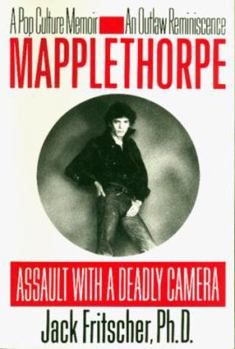Mapplethorpe: Assault with a Deadly Camera
Select Format
Select Condition 
Book Overview
A memoir of the famous photographer by a former friend. This description may be from another edition of this product.
Format:Hardcover
Language:English
ISBN:0803893620
ISBN13:9780803893627
Release Date:January 1994
Publisher:Hastings House Book Publishers
Length:350 Pages
Weight:1.65 lbs.
Dimensions:1.4" x 6.5" x 9.5"
Customer Reviews
5 ratings
Many authors wrote this book by Fritscher
Published by Thriftbooks.com User , 20 years ago
By chasing down lots of interviews, author Fritscher manages to have several friends of Mapplethorpe compose their thoughts of robert and his photographs. The beauty of this book is the multiple voices speaking which Fritscher takes the time to present to honor Mapplethorpe. He could have had the last word himself--after all, he had the book contract and was the man's sometime lover. This Mapplethorpe memoir is actually written by the following artists and personalities who Fritscher presents--AND LETS SPEAK IN THEIR OWN VOICES WHICH HE COLLECTED: GEORGE DUREAU, HOLLY SOLOMON, CAMILLE O'GRADY, REX, MARK WALKER, THE INCREDIBLE MILES EVERETT, EDWARD LUCIE-SMITH, JOEL-PETER WITKIN. (Yes, this book is scary, and it gets scarier as time goes by and our culture becomes more puritanical. It's also a good reference book of those times and events that are now so far back in the past.
Very interesting "read" that penetrates 70s art & sex world
Published by Thriftbooks.com User , 21 years ago
Written as a tell-all memoir of pop culture, this book is amazing in what it tells us about lost lives in lost times. Real nostalgia. Actually, this book is loaded with "gay street credential." The fact that it has an index tells you the book seriously intends to record history's major and minor characters. Many gay pop culture books don't even bother to have an index which makes them useless. My litmus test in a book store is to first see if a book has an index, and then I skim it to see who's included and who's not, because that way I can judge the book's presentation and prejudices. Too bad Patty Smith doesn't write about Mapplethorpe and this period like his boyfriend did in writing this attack on American lying, political hypocrisy, and phoney art wackjobs. What is generously amazing is that boyfriend Fritscher seems to genuinely miss and mourne Mapplethorpe to the degree that he devotes 60% of the book to direct interviews with other Mapplethorpe art friends like George Dureau, Joel-Peter Witkin, and others who all speak for themselves.
I knew Bob Mapplethorpe
Published by Thriftbooks.com User , 22 years ago
I knew Bob Mapplethorpe, and I remember the 70's scene, and if Bob had lived to see all this book of which he'd read a part, he'd have reviewed it with his immortal line, "If you don't like this book, you ain't as avant garde as you think."
Shockingly personal confession of two artists and an era
Published by Thriftbooks.com User , 23 years ago
There is much reason to be shocked by the author's candor on the pages of this memoir, and that candor is index of how very true is the truth in this highly personal, highly polemical book. Mapplethorpe's impenetrable character opens up in the author's quite original thesis that Mapplethorpe was shocking more in his images of death than in his images of sex. Death in cut flowers. Death in imagery of guns, knives, etc. all the way to Mapplethorpe's own dying face. Book's thesis, despising art-world politics as much as the politically-correct gay world, connects Mapplethorpe's image manipulation to psychologically scarring and self-reflective Catholicism shared by both the photographer and the writer. Author writes scenes so formally detailed they read like film sequences. The marketing and lies of American culture are the real pornography exposed in this memoir. Even writing about Mapplethorpe, as Pultizer Prize winner Michael Cunningham found in Elle magazine, brings upon the writer and the book some of the opprobrium Mapplethorpe haters cannot level at the dead photographer, who is to this day hated as much by the fundamentalist right as the Marxist left, to say nothing of legions of gay photographers who unlike Mapplethorpe could not escape gay genre photography. This book's psyche is so raw the author must have suffered an agony in confessing his own emotional connection to a friend he repeatedly states he wishes to remember as a person and not a gifted technician or controversial symbol. Certainly, the author, as journalist, succeeded in eliciting poignant feelings, comments, memories, and grief from the blind boy in New Orleans, from painter George Dureau, from photographer Joel Peter Witkin. Book is personal, intense, and raw. The passing of time makes its historical "take" of the 1970's quite interesting.
This memoir should be a movie like "Pollock"
Published by Thriftbooks.com User , 23 years ago
This memoir has haunted me since I first read it. I'm no longer shocked, just haunted by the humanness of Mapplethorpe. A well written reminiscence about life in the fast lane and art that draws my emotions and intellect like recent movies on Jackson Pollock and Basquiat as well as Arenas in "Before Night Falls", and a bit like the film "Total Eclipse" about Rimbaud and Verlaine with Leonardo di Caprio. The Catholicism of both Mapplethorpe and the author Fritscher plays a fascinating role in the photographer's photo imagery and the author's desire to confess the inside curve of the fast lane of their life together. Photographer George Dureau is one of the strongest characters in the book along with the mystical photographer, Joel-Peter Witkin. Wild.





